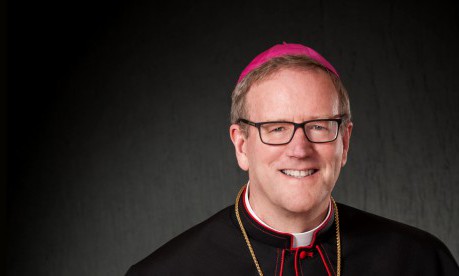On a spring day about five years ago, when I was rector of Mundelein Seminary, Francis Cardinal George spoke to the assembled student body. He congratulated those proudly orthodox seminarians for their devotion to the dogmatic and moral truths proposed by the Church, but he also offered some pointed pastoral advice.
He said that it is insufficient simply to drop the truth on people and then smugly walk away. Rather, he insisted, you must accompany those you have instructed, committing yourself to helping them integrate the truth that you have shared.
I thought of this intervention by the late cardinal often as I was reading Pope Francis’ apostolic exhortation Amoris Laetitia. If I might make bold to summarize a complex 264-page document, I would say that Pope Francis wants the truths regarding marriage, sexuality, and family to be unambiguously declared, but that he also wants the Church’s ministers to reach out in mercy and compassion to those who struggle to incarnate those truths in their lives.
In regard to the moral objectivities of marriage, the Pope is bracingly clear. He unhesitatingly puts forward the Church’s understanding that authentic marriage is between a man and a woman, who have committed themselves to one another in permanent fidelity, expressing their mutual love and openness to children, and abiding as a sacrament of Christ’s love for his Church (52, 71).
He bemoans any number of threats to this ideal, including moral relativism, a pervasive cultural narcissism, the ideology of self-invention, pornography, the “throwaway” society, etc. He explicitly calls to our attention the teaching of Pope Paul VI in Humanae Vitae regarding the essential connection between the unitive and the procreative dimensions of conjugal love (80).
Moreover, he approvingly cites the consensus of the recent Synod on the Family that homosexual relationships cannot be considered even vaguely analogous to what the Church means by marriage (251). He is especially strong in his condemnation of ideologies that dictate that gender is merely a social construct and can be changed or manipulated according to our choice (56).
Such moves are tantamount, he argues, to forgetting the right relationship between creature and Creator. Finally, any doubt regarding the Pope’s attitude toward the permanence of marriage is dispelled as clearly and directly as possible: “The indissolubility of marriage—‘what God has joined together, let no man put asunder’ (Mt 19:6) —should not be viewed as a ‘yoke’ imposed on humanity, but as a ‘gift’ granted to those who are joined in marriage…” (62). Continue reading
- Bishop Robert Barron is an auxiliary bishop of the Archdiocese of Los Angeles and the founder of Word on Fire Catholic Ministries.
- See also: Francis’ sprawling Exhortation a marriage of profound and muddled
